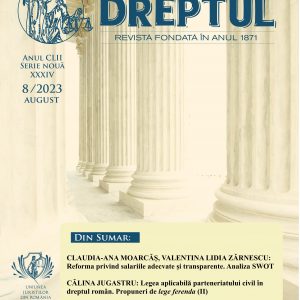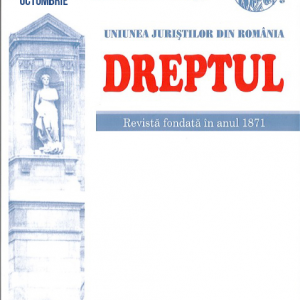-

-
 În condiþiile în care nu existã, în prezent, dispoziþii general aplicabile în legislaþia privind circulaþia juridicã a terenurilor, care sã reglementeze dreptul de preemþiune ca o condiþie de nulitate a actului de înstrãinare încheiat cu încãlcarea acestui drept, legiuitorul a lãsat în atributul legilor speciale sã reglementeze dreptul de preemþiune, în funcþie de natura juridicã a bunului. În cazul arendei, la data încheierii contractului de arendã, ca ºi în prezent, dreptul de preemþiune nu este reglementat de lege ca un impediment legal în transmiterea cãtre o altã persoanã a dreptului de proprietate, ci ca un drept contractual al arendaºului.
În condiþiile în care nu existã, în prezent, dispoziþii general aplicabile în legislaþia privind circulaþia juridicã a terenurilor, care sã reglementeze dreptul de preemþiune ca o condiþie de nulitate a actului de înstrãinare încheiat cu încãlcarea acestui drept, legiuitorul a lãsat în atributul legilor speciale sã reglementeze dreptul de preemþiune, în funcþie de natura juridicã a bunului. În cazul arendei, la data încheierii contractului de arendã, ca ºi în prezent, dreptul de preemþiune nu este reglementat de lege ca un impediment legal în transmiterea cãtre o altã persoanã a dreptului de proprietate, ci ca un drept contractual al arendaºului. -
 Cererea în despãgubire din valoarea cauțiunii este o cerere contencioasã, care presupune examinarea elementelor rãspunderii civile delictuale sub aspectul exercițiului abuziv al acțiunii, al prejudiciului produs și al legãturii de cauzalitate dintre paguba pricinuitã și conduita procesualã a pãrþii, competența de soluționare a unei astfel de acțiuni patrimoniale fiind reglementatã de dispozițiile generale cuprinse în cartea I din Codul de procedurã civilã (Înalta Curte de Casaþie și Justiție, Secția comercialã, decizia nr. 4170 din 30 noiembrie 2010).
Cererea în despãgubire din valoarea cauțiunii este o cerere contencioasã, care presupune examinarea elementelor rãspunderii civile delictuale sub aspectul exercițiului abuziv al acțiunii, al prejudiciului produs și al legãturii de cauzalitate dintre paguba pricinuitã și conduita procesualã a pãrþii, competența de soluționare a unei astfel de acțiuni patrimoniale fiind reglementatã de dispozițiile generale cuprinse în cartea I din Codul de procedurã civilã (Înalta Curte de Casaþie și Justiție, Secția comercialã, decizia nr. 4170 din 30 noiembrie 2010). -
 Verificarea respectării normelor de competență se realizează atât de instanța învestită cu judecarea litigiului, la cererea părților sau din oficiu, cât și pe calea controlului judiciar, de către instanțele superioare învestite cu judecarea căilor de atac. În acest din urmă caz, hotărârea instanței de control judiciar prin care se statuează cu privire la competența unei instanțe de a soluționa litigiul este obligatorie, atât timp cât aceasta este irevocabilă.
Verificarea respectării normelor de competență se realizează atât de instanța învestită cu judecarea litigiului, la cererea părților sau din oficiu, cât și pe calea controlului judiciar, de către instanțele superioare învestite cu judecarea căilor de atac. În acest din urmă caz, hotărârea instanței de control judiciar prin care se statuează cu privire la competența unei instanțe de a soluționa litigiul este obligatorie, atât timp cât aceasta este irevocabilă. -
 Cererea formulatã de debitorul cedat privind restituirea unei sume de bani achitatã A.V.A.S. în baza unui contract de cesiune de creanţã, prin care Ministerul Finanţelor Publice a cesionat A.V.A.S. creanţa pe care o avea faţã de societatea debitoare, sumã de bani nedatoratã, se încadreazã în dispoziţiile art. 45 din O.U.G. nr. 51/1998 care se referã la „cereri de orice naturã” privind drepturi şi obligaţii în legãturã cu activele preluate de A.V.A.S., cereri supuse unui termen special de prescripţie reglementat de art. 49 alin. (1) de 6 luni de la data la care s-a cunoscut, sau trebuia sã se cunoascã faptul sau actul pe care se întemeiazã (Înalta Curte de Casaţie şi Justiţie, Secţia a II-a civilã, decizia nr. 2928 din 4 octombrie 2011).
Cererea formulatã de debitorul cedat privind restituirea unei sume de bani achitatã A.V.A.S. în baza unui contract de cesiune de creanţã, prin care Ministerul Finanţelor Publice a cesionat A.V.A.S. creanţa pe care o avea faţã de societatea debitoare, sumã de bani nedatoratã, se încadreazã în dispoziţiile art. 45 din O.U.G. nr. 51/1998 care se referã la „cereri de orice naturã” privind drepturi şi obligaţii în legãturã cu activele preluate de A.V.A.S., cereri supuse unui termen special de prescripţie reglementat de art. 49 alin. (1) de 6 luni de la data la care s-a cunoscut, sau trebuia sã se cunoascã faptul sau actul pe care se întemeiazã (Înalta Curte de Casaţie şi Justiţie, Secţia a II-a civilã, decizia nr. 2928 din 4 octombrie 2011). -
 Prin noțiunea de preț serios, astfel cum prevãd dispozițiile art. 1303 C.civ. anterior (1864), se înțelege prețul care constituie o cauzã suficientã a obligației luate de vânzãtor de a transmite dreptul de proprietate asupra bunului ce formeazã obiectul vânzãrii.
Prin noțiunea de preț serios, astfel cum prevãd dispozițiile art. 1303 C.civ. anterior (1864), se înțelege prețul care constituie o cauzã suficientã a obligației luate de vânzãtor de a transmite dreptul de proprietate asupra bunului ce formeazã obiectul vânzãrii. -
 Din conținutul art. 64 din Ordonanța de urgență a Guvernului nr. 109/2005 și art. V din Ordonanța de urgență a Guvernului nr. 34/2010 rezultă că actul prin care s-a dispus măsura administrativă de suspendare a dreptului de utilizare a unui vehicul, prin reținerea certificatului de înmatriculare și a plăcuțelor cu numărul de înmatriculare, are caracterul unui act administrativ autonom, conținând o sancțiune de sine stătătoare, care poate fi contestat la instanța de contencios administrativ, în condițiile Legii nr. 554/2004.
Din conținutul art. 64 din Ordonanța de urgență a Guvernului nr. 109/2005 și art. V din Ordonanța de urgență a Guvernului nr. 34/2010 rezultă că actul prin care s-a dispus măsura administrativă de suspendare a dreptului de utilizare a unui vehicul, prin reținerea certificatului de înmatriculare și a plăcuțelor cu numărul de înmatriculare, are caracterul unui act administrativ autonom, conținând o sancțiune de sine stătătoare, care poate fi contestat la instanța de contencios administrativ, în condițiile Legii nr. 554/2004. -
 În ipoteza unei promisiuni bilaterale de vânzare-cumpărare, respectiv a unui act juridic prin care părțile se obligă să încheie în viitor un contract de vânzarecumpărare, acțiunea prin care beneficiarul promisiunii îi solicită instanței să pronunțe o hotărâre care să țină loc de act autentic de vânzare-cumpărare este supusă termenului general de prescripție extinctivă, chiar dacă bunul la care se referă convenția părților este un imobil, deoarece obiectul antecontractului nu este bunul imobil, ci obligația de a face, a cărei executare poate fi solicitată doar în cadrul termenului de prescripție extinctivă. (Înalta Curte de Casație și Justiție, Secția I civilă, Decizia nr. 3447 din 4 decembrie 2014)
În ipoteza unei promisiuni bilaterale de vânzare-cumpărare, respectiv a unui act juridic prin care părțile se obligă să încheie în viitor un contract de vânzarecumpărare, acțiunea prin care beneficiarul promisiunii îi solicită instanței să pronunțe o hotărâre care să țină loc de act autentic de vânzare-cumpărare este supusă termenului general de prescripție extinctivă, chiar dacă bunul la care se referă convenția părților este un imobil, deoarece obiectul antecontractului nu este bunul imobil, ci obligația de a face, a cărei executare poate fi solicitată doar în cadrul termenului de prescripție extinctivă. (Înalta Curte de Casație și Justiție, Secția I civilă, Decizia nr. 3447 din 4 decembrie 2014) -
 ACȚIUNE CIVILÃ. ASIGURÃTOR DE RÃSPUNDERE CIVILÃ În conformitate cu dispozițiile Legii nr. 136/1995, instanța dispune obligarea asigurãtorului de rãspundere civilã, în mod direct, în limita obligației sale contractuale, la plata despãgubirilor cãtre partea civilã (Înalta Curte de Casație și Justiție, Secția penalã, decizia nr. 3405 din 23 octombrie 2012).
ACȚIUNE CIVILÃ. ASIGURÃTOR DE RÃSPUNDERE CIVILÃ În conformitate cu dispozițiile Legii nr. 136/1995, instanța dispune obligarea asigurãtorului de rãspundere civilã, în mod direct, în limita obligației sale contractuale, la plata despãgubirilor cãtre partea civilã (Înalta Curte de Casație și Justiție, Secția penalã, decizia nr. 3405 din 23 octombrie 2012). -
 Contestația în anulare împotriva deciziilor rămase definitive în recurs, prin care a fost invocată încălcarea principiului non bis in idem, se judecă în conformitate cu dispozițiile noului Cod de procedură penală în materia contestației în anulare. Cazul de contestație în anulare, prevăzut în art. 426 lit. i) din noul Cod de procedură penală, referitor la ipoteza în care „împotriva unei persoane s-au pronunțat două hotărâri definitive pentru aceeași faptă”, nu este incident, dacă faptele cu privire la care s-au pronunțat două hotărâri definitive de condamnare sunt diferite, neexistând identitate de faptă, indiferent dacă încadrarea juridică a faptelor este aceeași. (Înalta Curte de Casație și Justiție, Secția penală, Decizia nr. 1479 din 29 aprilie 2014)
Contestația în anulare împotriva deciziilor rămase definitive în recurs, prin care a fost invocată încălcarea principiului non bis in idem, se judecă în conformitate cu dispozițiile noului Cod de procedură penală în materia contestației în anulare. Cazul de contestație în anulare, prevăzut în art. 426 lit. i) din noul Cod de procedură penală, referitor la ipoteza în care „împotriva unei persoane s-au pronunțat două hotărâri definitive pentru aceeași faptă”, nu este incident, dacă faptele cu privire la care s-au pronunțat două hotărâri definitive de condamnare sunt diferite, neexistând identitate de faptă, indiferent dacă încadrarea juridică a faptelor este aceeași. (Înalta Curte de Casație și Justiție, Secția penală, Decizia nr. 1479 din 29 aprilie 2014) -
 Potrivit art. 1491 C.pr.pen., procurorul, când considerã cã arestarea inculpatului este în interesul urmãririi penale, întocmeşte propunerea motivatã de luare a mãsurii arestãrii preventive a acestuia numai dupã ascultarea inculpatului în prezenţa apãrãtorului. În plus, conform art. 150 alin. 1 C.pr.pen., mãsura arestãrii inculpatului poate fi luatã numai dupã ascultarea acestuia de cãtre procuror şi de cãtre judecãtor, afarã de cazul când inculpatul se aflã în strãinãtate ori se sustrage de la urmãrire sau de la judecatã ori se aflã în una dintre situaţiile prevãzute în art. 1491 alin. 6 C.pr.pen. (cu notã criticã).
Potrivit art. 1491 C.pr.pen., procurorul, când considerã cã arestarea inculpatului este în interesul urmãririi penale, întocmeşte propunerea motivatã de luare a mãsurii arestãrii preventive a acestuia numai dupã ascultarea inculpatului în prezenţa apãrãtorului. În plus, conform art. 150 alin. 1 C.pr.pen., mãsura arestãrii inculpatului poate fi luatã numai dupã ascultarea acestuia de cãtre procuror şi de cãtre judecãtor, afarã de cazul când inculpatul se aflã în strãinãtate ori se sustrage de la urmãrire sau de la judecatã ori se aflã în una dintre situaţiile prevãzute în art. 1491 alin. 6 C.pr.pen. (cu notã criticã). -
 Elementul material al infracțiunii de înșelãciune existã distinct de elementul material al infracțiunii de fals în înscrisuri sub semnãturã privatã, activitatea de falsificare a înscrisurilor și folosirea lor în vederea producerii de consecințe juridice consumându-se la momentul sesizãrii instanței, activitatea ulterioarã desfãșuratã de inculpat de inducere în eroare a pãrților vãtãmate în scopul obținerii unui folos material injust realizând latura obiectivã a infracțiunii de înșelãciune, rãmasã în forma tentativei (cu notã criticã)
Elementul material al infracțiunii de înșelãciune existã distinct de elementul material al infracțiunii de fals în înscrisuri sub semnãturã privatã, activitatea de falsificare a înscrisurilor și folosirea lor în vederea producerii de consecințe juridice consumându-se la momentul sesizãrii instanței, activitatea ulterioarã desfãșuratã de inculpat de inducere în eroare a pãrților vãtãmate în scopul obținerii unui folos material injust realizând latura obiectivã a infracțiunii de înșelãciune, rãmasã în forma tentativei (cu notã criticã)
